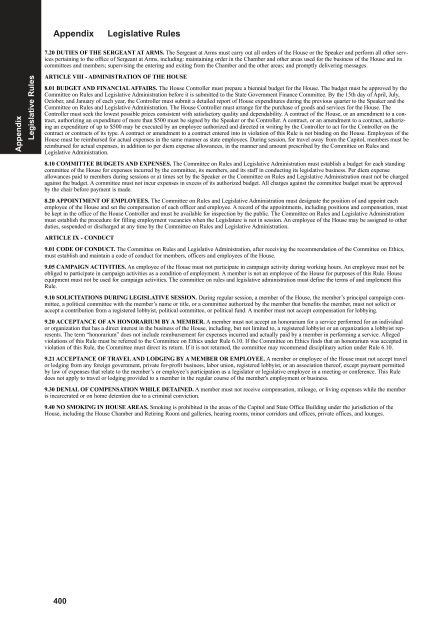Chapter One Federal Government - Minnesota State Legislature
Chapter One Federal Government - Minnesota State Legislature
Chapter One Federal Government - Minnesota State Legislature
Create successful ePaper yourself
Turn your PDF publications into a flip-book with our unique Google optimized e-Paper software.
Appendix<br />
Legislative Rules<br />
Appendix Legislative Rules<br />
7.20 DUTIES OF THE SERGEANT AT ARMS. The Sergeant at Arms must carry out all orders of the House or the Speaker and perform all other services<br />
pertaining to the office of Sergeant at Arms, including: maintaining order in the Chamber and other areas used for the business of the House and its<br />
committees and members; supervising the entering and exiting from the Chamber and the other areas; and promptly delivering messages.<br />
ARTICLE VIII - ADMINISTRATION OF THE HOUSE<br />
8.01 BUDGET AND FINANCIAL AFFAIRS. The House Controller must prepare a biennial budget for the House. The budget must be approved by the<br />
Committee on Rules and Legislative Administration before it is submitted to the <strong>State</strong> <strong>Government</strong> Finance Committee. By the 15th day of April, July,<br />
October, and January of each year, the Controller must submit a detailed report of House expenditures during the previous quarter to the Speaker and the<br />
Committee on Rules and Legislative Administration. The House Controller must arrange for the purchase of goods and services for the House. The<br />
Controller must seek the lowest possible prices consistent with satisfactory quality and dependability. A contract of the House, or an amendment to a contract,<br />
authorizing an expenditure of more than $500 must be signed by the Speaker or the Controller. A contract, or an amendment to a contract, authorizing<br />
an expenditure of up to $500 may be executed by an employee authorized and directed in writing by the Controller to act for the Controller on the<br />
contract or contracts of its type. A contract or amendment to a contract entered into in violation of this Rule is not binding on the House. Employees of the<br />
House must be reimbursed for actual expenses in the same manner as state employees. During session, for travel away from the Capitol, members must be<br />
reimbursed for actual expenses, in addition to per diem expense allowances, in the manner and amount prescribed by the Committee on Rules and<br />
Legislative Administration.<br />
8.10 COMMITTEE BUDGETS AND EXPENSES. The Committee on Rules and Legislative Administration must establish a budget for each standing<br />
committee of the House for expenses incurred by the committee, its members, and its staff in conducting its legislative business. Per diem expense<br />
allowances paid to members during sessions or at times set by the Speaker or the Committee on Rules and Legislative Administration must not be charged<br />
against the budget. A committee must not incur expenses in excess of its authorized budget. All charges against the committee budget must be approved<br />
by the chair before payment is made.<br />
8.20 APPOINTMENT OF EMPLOYEES. The Committee on Rules and Legislative Administration must designate the position of and appoint each<br />
employee of the House and set the compensation of each officer and employee. A record of the appointments, including positions and compensation, must<br />
be kept in the office of the House Controller and must be available for inspection by the public. The Committee on Rules and Legislative Administration<br />
must establish the procedure for filling employment vacancies when the <strong>Legislature</strong> is not in session. An employee of the House may be assigned to other<br />
duties, suspended or discharged at any time by the Committee on Rules and Legislative Administration.<br />
ARTICLE IX - CONDUCT<br />
9.01 CODE OF CONDUCT. The Committee on Rules and Legislative Administration, after receiving the recommendation of the Committee on Ethics,<br />
must establish and maintain a code of conduct for members, officers and employees of the House.<br />
9.05 CAMPAIGN ACTIVITIES. An employee of the House must not participate in campaign activity during working hours. An employee must not be<br />
obliged to participate in campaign activities as a condition of employment. A member is not an employee of the House for purposes of this Rule. House<br />
equipment must not be used for campaign activities. The committee on rules and legislative administration must define the terms of and implement this<br />
Rule.<br />
9.10 SOLICITATIONS DURING LEGISLATIVE SESSION. During regular session, a member of the House, the member’s principal campaign committee,<br />
a political committee with the member’s name or title, or a committee authorized by the member that benefits the member, must not solicit or<br />
accept a contribution from a registered lobbyist, political committee, or political fund. A member must not accept compensation for lobbying.<br />
9.20 ACCEPTANCE OF AN HONORARIUM BY A MEMBER. A member must not accept an honorarium for a service performed for an individual<br />
or organization that has a direct interest in the business of the House, including, but not limited to, a registered lobbyist or an organization a lobbyist represents.<br />
The term “honorarium” does not include reimbursement for expenses incurred and actually paid by a member in performing a service. Alleged<br />
violations of this Rule must be referred to the Committee on Ethics under Rule 6.10. If the Committee on Ethics finds that an honorarium was accepted in<br />
violation of this Rule, the Committee must direct its return. If it is not returned, the committee may recommend disciplinary action under Rule 6.10.<br />
9.21 ACCEPTANCE OF TRAVEL AND LODGING BY A MEMBER OR EMPLOYEE. A member or employee of the House must not accept travel<br />
or lodging from any foreign government, private for-profit business, labor union, registered lobbyist, or an association thereof, except payment permitted<br />
by law of expenses that relate to the member’s or employee’s participation as a legislator or legislative employee in a meeting or conference. This Rule<br />
does not apply to travel or lodging provided to a member in the regular course of the member's employment or business.<br />
9.30 DENIAL OF COMPENSATION WHILE DETAINED. A member must not receive compensation, mileage, or living expenses while the member<br />
is incarcerated or on home detention due to a criminal conviction.<br />
9.40 NO SMOKING IN HOUSE AREAS. Smoking is prohibited in the areas of the Capitol and <strong>State</strong> Office Building under the jurisdiction of the<br />
House, including the House Chamber and Retiring Room and galleries, hearing rooms, minor corridors and offices, private offices, and lounges.<br />
400
















